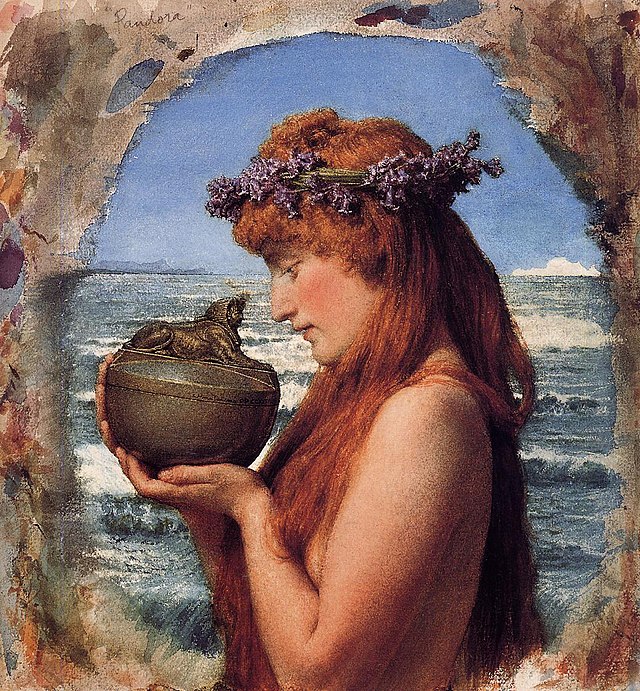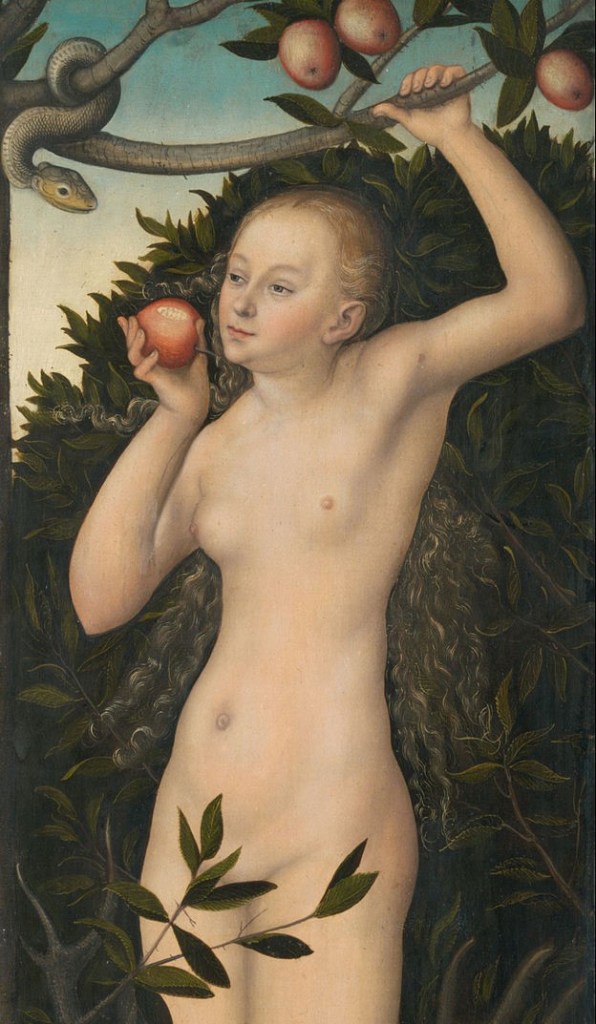
In my last post I mentioned the tale of Prometheus who stole fire from the gods. Zeus’s punishment of eternal torture was not enough to avenge the offense.[i] In addition, Zeus punished the entire human race by sending the first woman, Pandora. Pandora is a woman of “all gifts,” one of which is the curiosity that drives Pandora to open the forbidden jar, unleashing evils and miseries into the world. Woman as punishment, as the bringer of evil and misery — these themes have shaped the western view of women for millennia.

Similarly, the Judaeo-Christian story of Eve tells of how the first woman, also through curiosity, eats the forbidden fruit of the tree of knowledge, thereby bringing evil into the world. With Tertullian’s condemnation of all women as Eve — “Do you not know that you are Eve? . . . You are the gateway of the devil,” [ii] and Augustine’s interpretation of Eve as the originator of sin in the world, women would henceforth be regarded as the source of evil in the world.
While women have suffered condemnation and subordination based on these myths, it is women’s curiosity in particular against which we are warned, a theme repeated in the stories of Psyche and Bluebeard. Psyche,[iii] commanded to meet her husband only in darkness and never to look upon him, at the urgings of her sisters, lets her curiosity gets the better of her. Using lamplight[iv] to look upon his face, she discovers he is Venus’s son, Eros, invoking Venus’s punishing wrath.

Bluebeard’s young wife, like Psyche, is urged by her curious sisters to open the door of the one room forbidden her. There they find the corpses of Bluebeard’s previous wives whose curiosity had gotten them killed. A furious Bluebeard screams that it is now her turn. In the end, she gathers the support of her sisters and brothers who kill Bluebeard, but the warning against curiosity remains.
I’ve become curious about this caution against curiosity. What is to be feared in women’s curiosity, who fears it, and why? The answer seems obvious. Those upholding the status quo -patriarchy, white supremacy, capitalism, militarism – are fearful of those who would render these suspect in order to maintain a system that profits them, that upholds their power and status. “So many power structures – inside households, within institutions, in societies, in international affairs – are dependent on our continuing lack of curiosity,” writes feminist theorist Cynthia Enloe.[v]
When my son was about three, his persistent word was “why”? He puzzled over things that didn’t make sense – like why fire fighters were referred to as “firemen.” Girls can be fire fighters, too, he reasoned. Like Psyche’s lamp, his questions were illuminating, and made me wonder about things I’d just taken for the way things are.
The way things are. That phrase can normalize so much that is privilege and power for some. Enloe names other phrases that dampen our curiosity – “natural,” “tradition,” “always.” It’s natural for women to take care of children. It’s tradition that the father gives away the bride. “Always” is often used to justify women’s secondary status – it’s just the way it’s always been — as if patriarchy didn’t have a beginning.[vi] “With the passage of time, certain ideas. . . begin to seem as if they have always existed,” wrote Susan Griffin. “In this way they move outside the confines of doubt. . . . and give the illusory sense of natural law.”[vii]
Similarly, our bodies can exhibit symptoms – neck tension, lower backache, nausea — that we eventually regard as “normal.” In Somatic Experiencing® and Indigenous Focusing-Oriented trauma therapy, we are trained to approach these bodily clues with curiosity — befriend them; ask them questions — why are they there? what do they need to say? are they familiar? are they all yours? With sincere inquisitiveness and loving attention, the body releases the trapped energies, often revealing aspects of our lives that have long been hidden, but that are important for us to know. Likewise, we need to approach the aches and disquietudes of our body politic with curiosity in order to reveal the things that are important for us to know in order to change them. [viii]

In the tales of Psyche and Bluebeard, it is the women’s sisters who fan the flames of curiosity, and in the case of Eve, it is the serpent goddess. While some may interpret this as women undermining other women, I regard it as the gift of sisterhood — women encouraging women to ask questions, to seek forbidden knowledge, to upend the patriarchy.
This was the power of consciousness-raising groups which consisted of asking questions and answering them honestly from one’s experience, without judgment or critique from others or oneself. Commenting on Bluebeard, Clarissa Pinkola Estes wrote the forbidden key is the one that would awaken consciousness, and that “to forbid a woman to use the key to consciousness strips away Wild Woman, her natural instinct for curiosity and her discovery of ‘what lies underneath.’”[ix] She continues that trivializing women’s curiosity “denies women’s insight, hunches, intuitions . . . . It attempts to attack her fundamental power.”[x] Consciousness-raising groups encouraged this curiosity, this uncovering of truths, validated women’s intuitions and knowings, and empowered women to act to change their lives and the world.
In this time of the erosion of women’s rights, environmental protections, gay rights, affirmative action, and the grip of the radical right in Congress and the courts, it is easy to fall into cynicism. However, as Enloe warns, “cynicism dulls curiosity.”[xi] Curiosity is what we most need at this time to ensure that those choices of a few don’t, in Griffin’s words, “fade into the background of normalcy.”[xii] Rather we need to continue asking questions, approaching every impingement on the body politic with the curiosity that keeps the possibility of hope alive.
After Pandora unleashed all the miseries into the world, and put the lid back on the jar, the only thing left in her jar was hope. The hopes of the world rest on the gift of curiosity that the Pandoras of the world, the curious feminists, have to give.
Sources
Enloe, Cynthia. 2004. The Curious Feminist: Searching for Women in a New Age of Empire. Berkeley: University of California Press.
Estes, Clarissa Pinkola. 1992. Women Who Run with the Wolves: Myths and Stories of the Wild Woman Archetype. New York: Ballantine Books.
Griffin, Susan. 1992. A Chorus of Stones: The Private Life of War. New York: Anchor Books.
Hamilton, Edith. 1942. Mythology: Timeless Tales of Gods and Heroes. New York: New American Library.
Lerner, Gerda. 1986. The Creation of Patriarchy. New York: Oxford University Press.
______. 2022. The Quaking of America: An Embodied Guide to Navigating Our Nation’s Upheaval and Racial Reckoning. Las Vegas: Central Recovery Press.
Norris, Pamela. 1998. Eve: A Biography. New York: New York University Press.
Tertullian, De Cultu Feminarum, (On the Apparel of Women) Sec. 1.1, part 2.
[i] Prometheus was chained to a rock where an eagle would eat his liver every day, and it would grow back every night only to be eaten again the next day.
[ii] Tertullian (c. 155 – c. 220) was a Christian theologian who is often considered the founder of Western theology.
[iii] Psyche is commanded at Apollo’s direction has been dressed as a bride and left on a mountaintop to face “dire mischief,” instead awakens in a palace where she is visited by her unknown husband, with whom she falls deeply in love. who beats Psyche and sets her upon several tasks. Unlike Pandora and Eve, she is not responsible for the ills of humanity, and is eventually reunited with Eros, she does suffer from her inquisitiveness, using what has become emblematic of the lamp of knowledge to light her way
[iv] The lamp is now emblematic of the light of knowledge.
[v] Enloe,3.
[vi] And as feminist historian Gerda Lerner said, if patriarchy had a beginning, then it can have an end.
[vii]Griffin, 204. In her masterpiece, A Chorus of Stones, Griffin shows how the strategies, tactics, and armaments of war indeed the very existence of war and militarism, have rested on the choices of just one or a few individuals, who might have chosen differently. War is not “inevitable” or “natural,” or “just the way things are, but rather the result of individual choices that can be questioned and changed.
[viii] Our awareness of dis-ease in our body politic may first appear in our own physical bodies. Resmaa Menakem provides an excellent analysis of the ways in which the politics of racism in this country surface in our physical bodies. Similar analyses can be made of the ways patriarchy, heterosexism, capitalism, and so on manifest in our bodies.
[ix] Estes, 51.
[x] Ibid., 52.
[xi] Enloe, 18.
[xii] Griffin, 204.


patriarchy etc and here’s the rest … trivializing women’s curiosity “denies women’s insight, hunches, intuitions . . . . It attempts to attack her fundamental power. The truths of our body lead us home to ourselves and allow us to live and authentic life…. it’s also so important to ask when we have physical symptoms to ask: does this belong to me or not… we are all connected and others’ thoughts and behaviors can effect us in either a negative of positive way.
LikeLiked by 1 person
Such an important post! In my experience, essential change only begins when we suddenly realize that what we thought was absolute truth is not and we ask “why?” Interestingly, Charlene Spretnak, in her Lost Goddesses of Early Greece, tells a somewhat different story of Pandora as it may have first been, a story of the Earth goddess bringing fruitfulness to the world. I have also read somewhere, I forget where, that the jar she carried actually represented the mystery of the eternal cycle of life, death, and rebirth. So she brought joy, abundance, rebirth, and hope when she opened that jar! Just as asking questions to get to the truth also brings a better world. Whenever someone tells you to stop asking questions, you know that’s when it’s time to start because there is something they don’t want you to know!
LikeLiked by 1 person
Thanks, Beth and Carolyn. I love reinterpretations of foundational myths. Once we unpack their messages, we can follow them or reframe them.
LikeLiked by 1 person
Thanks, Carolyn. I’ll look for that. Yes, my understanding is that Pandora brought all those into the world. Your comment about continuing to ask questions when told to stop is so true.
LikeLike